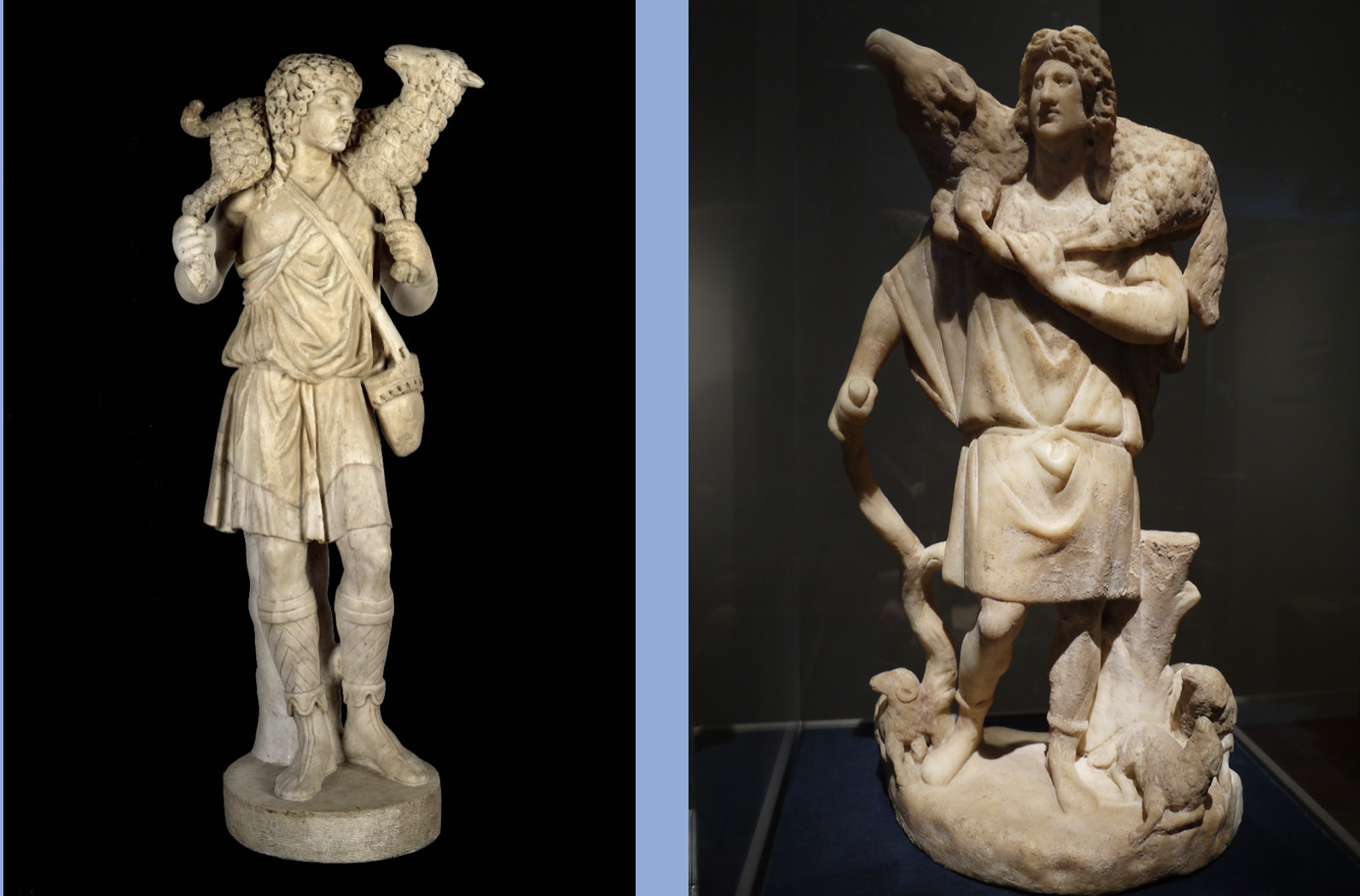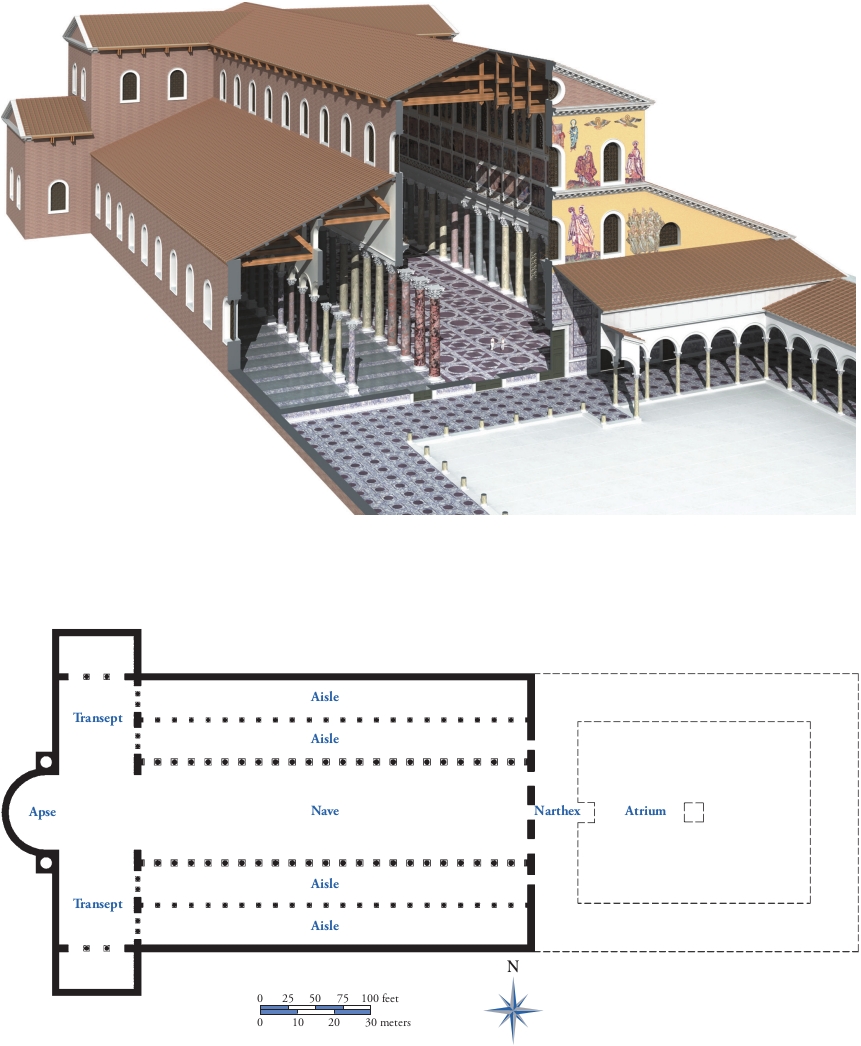Early Christian art and literature
1/4
There's no tags or description
Looks like no tags are added yet.
Name | Mastery | Learn | Test | Matching | Spaced | Call with Kai |
|---|
No analytics yet
Send a link to your students to track their progress
5 Terms
Vibia Perpetua, "Prologue” and “The Passion of Perpetua"
“Thus far I have written this, till the day before the games; but the deed of the games themselves let him write who will.”
“I am a Christian”:
“And as God willed, no longer did [my child] need to be suckled, nor did I take fever; that I might not be tormented by care for the child and by the pain of my breasts.”
Envisions her arena experience as a fight with the Devil
Salvation of her dead brother Dinocrates
Augustine, The Confessions
From Confessions, Book 8, chapter 12
I felt that I was still the captive of my sins, and in my misery I kept crying “How long shall I go on saying ‘tomorrow, tomorrow’? Why not now? Why not make an end of my ugly sins at this moment?”
I was asking myself these questions, weeping all the while with the most bitter sorrow in my heart, when all at once I heard the sing-song voice of a child in a nearby house. Whether it was the voice of a boy or a girl I cannot say, but again and again it repeated the refrain “Take it and read, take it and read.” At this I looked up, thinking hard whether there was any kind of game in which children used to chant words like these, but I could not remember ever hearing them before. I stemmed the flood of tears and stood up, telling myself that this could only be a divine command to open my book of Scripture and read the first passage on which my eyes should fall.
…
So I hurried back to the place where Alypius was sitting, for when I stood up to move away I had put down the book containing Paul’s Epistles. I seized it and opened it, and in silence I read the first passage on which my eyes fell: Not in revelling and drunkenness, not in lust and wantonness, not in quarrels and rivalries. Rather, arm yourself with the Lord Jesus Christ; spend no more thought on nature and nature’s appetites. I had no wish to read more and no need to do so. For in an instant, as I came to the end of the sentence, it was as though the light of confidence flooded into my heart and all the darkness of doubt was dispelled.
The City of God, Book 19, chapter 7
Figure 7. Human society divided by differences of language. The misery of war, even when just
After the city or town comes the world, which the philosophers reckon as the third level of human society. They begin with the household, proceed to the city, and then arrive at the world. Now the world, being like a confluence of waters, is obviously more full of danger than the other communities by reason of its greater size. To begin with, on this level the diversity of languages separates man from man. For if two men meet, and are forced by some compelling reason not to pass on but to stay in company, then if neither knows the other’s language, it is easier for dumb animals, even of different kinds, to associate together than these men, although both are human beings. For when men cannot communicate their thoughts to each other, simply because of difference of language, all the similarity of their common human nature is of no avail to unite them in fellowship. So true is this that a man would be more cheerful with his dog for company than with a foreigner. I shall be told that the Imperial City has been at pains to impose on conquered peoples not only her yoke but her language also, as a bond of peace and fellowship, so that there should be no lack of interpreters but even a profusion of them. True; but think of the cost of this achievement! Consider the scale of those wars, with all that slaughter of human beings, all the human blood that was shed!
The City of God, Book 19, chapter 12
12. Peace is the instinctive aim of all creatures, and is even the ultimate purpose of war
Anyone who joins me in an examination, however slight, of human affairs, and the human nature we all share, recognizes that just as there is no man who does not wish for joy, so there is no man who does not wish for peace. Indeed, even when men choose war, their only wish is for victory; which shows that their desire in fighting is for peace with glory. For what is victory but the conquest of the opposing side? And when this is achieved, there will be peace. Even wars, then, are waged with peace as their object, even when they are waged by those who are concerned to exercise their warlike prowess, either in command or in the actual fighting. Hence it is an established fact that peace is the desired end of war. For every man is in quest of peace, even in waging war, whereas no one is in quest of war when making peace. In fact, even when men wish a present state of peace to be disturbed they do so not because they hate peace, but because they desire the present peace to be exchanged for one that suits their wishes. Thus their desire is not that there should not be peace but that it should be the kind of peace they wish for. Even in the extreme case when they have separated themselves from others by sedition, they cannot achieve their aim unless they maintain some sort of semblance of peace with their confederates in conspiracy. Moreover, even robbers, to ensure greater efficiency and security in their assaults on the peace of the rest of mankind, desire to preserve peace with their associates.
From The Literal Meaning of Genesis, chapter 19
Usually, even a non-Christian knows something about the earth, the heavens, and the other elements of this world, about the motion and orbit of the stars and even their size and relative positions, about the predictable eclipses of the sun and moon, the cycles of the years and the seasons, about the kinds of animals, shrubs, stones, and so forth, and this knowledge he holds to as being certain from reason and experience. Now, it is a disgraceful and dangerous thing for an infidel to hear a Christian, presumably giving the meaning of Holy Scripture, talking nonsense on these topics; and we should take all means to prevent such an embarrassing situation, in which people show up vast ignorance in a Christian and laugh it to scorn. The shame is not so much that an ignorant individual is derided, but that people outside the household of the faith think our sacred writers held such opinions, and, to the great loss of those for whose salvation we toil, the writers of our Scripture are criticized and rejected as unlearned men. If they find a Christian mistaken in a field which they themselves know well and hear him maintaining his foolish opinions about our books, how are they going to believe those books in matters concerning the resurrection of the dead, the hope of eternal life, and the kingdom of heaven, when they think their pages are full of falsehoods on facts which they themselves have learnt from experience and the light of reason?
Good shepherd sculpture
The artist depicts Jesus as a beardless young man in a contrapposto stance, with his weight shifting from one leg to the other as he balances the sheep over his shoulders. His drilled, curly hair and slightly parted lips are distinctly Classical, as is the subtle draping of his tunic.

Jonah sarcophagus
depicts the salvation of Jonah, Christ as the Good Shepherd, and the baptism of Christ. As in the fresco from the Catacomb of Saints Pietro and Marcellino, the artist creates a harmonious blend of Hebrew and Christian Bible scenes, emphasizing the common denominator of an afterlife.

Old St. Peter’s Basilica
erected on the site where it was believed that Saint Peter was buried
